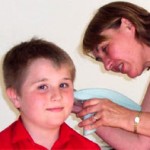Does Your Child Need A Hearing Aid?
 All five senses are important for proper development of a child and the loss of any of them is traumatic. The sense of hearing is also very important and the good thing is that modern hearing aids can help to a great degree should the need arise. Only a qualified doctor can decide after intensive testing whether a child suffers from a loss of hearing and to what extent the loss is.
All five senses are important for proper development of a child and the loss of any of them is traumatic. The sense of hearing is also very important and the good thing is that modern hearing aids can help to a great degree should the need arise. Only a qualified doctor can decide after intensive testing whether a child suffers from a loss of hearing and to what extent the loss is.
A couple of days after a child is born a paediatrician will check the hearing ability of a child by clapping first on one side of a child’s head and then at the other. The child will either turn his head or look to the side the sound comes from, or show some reaction to indicate that he has heard a sound. This will show that all is well. If there is any doubt, or this test proves inconclusive, then the test needs to be repeated in a few months’ time and every six months till the child attains the age of three.
Parents should be alert and inform the paediatrician if they notice any symptoms. They have to be especially careful if deafness runs in the family, or there is an injury to the head, or there is an ear infection. Some diseases also cause deafness as do some adverse reaction to medicines.
A child learns to speak by hearing what is being said so if he is unable to do so, his development is jeopardised. It is essential for treatment to begin at the earliest. A doctor will determine where the problem lies. He will check if there is structural inadequacy. The doctor has many options in the form of surgery, therapy or hearing aids so parents should not lose hope. Once the treatment begins, the child will develop normally.
If the child is fitted with a hearing aid in early childhood, he will adapt easily to it. Therapy will follow and specialised therapy for toddlers is available. They will be taught how to lip read. Both parents and the child will be taught sign language so that they can communicate with each other easily. Easy to follow play way method is used so the child will learn easily.
A number of institutions and help groups are there in each area of the country to bring the latest research to the affected children. Parents can contact these associations for finding good doctors and for getting other useful information. They also dispense information on how to bring up hearing impaired children and offer valuable tips to the parents. They also guide the parents through checklists that can help to know if a child has hearing impairment.
Parents who are expecting the birth of a child should familiarise themselves with the symptoms of hearing loss and the way it affects development. In the unfortunate event that such a thing occurs, they will be able to pin point the problem and consult a doctor immediately.